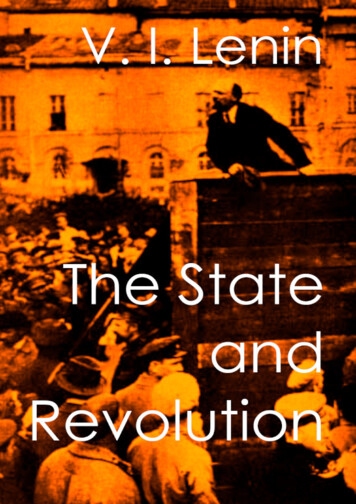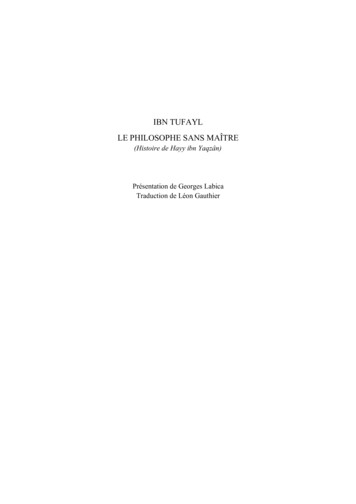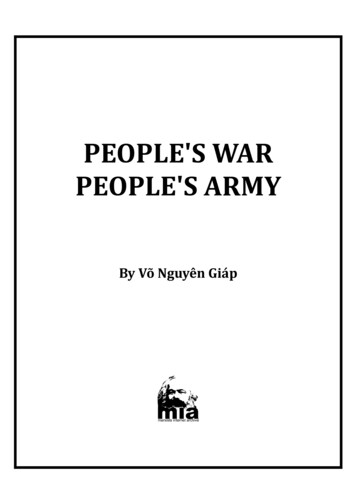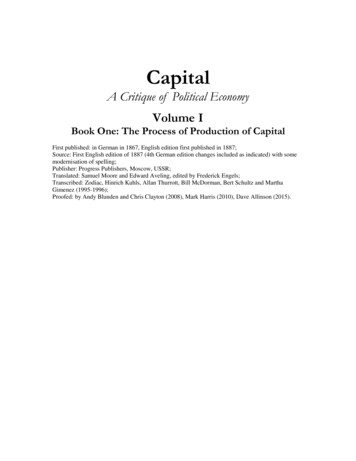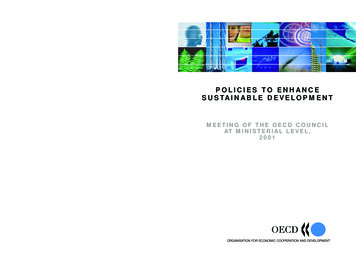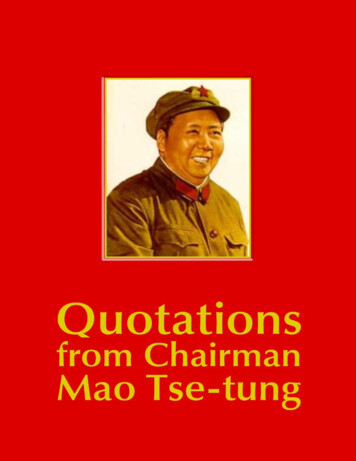
Transcription
QUOTATIONSFROM CHAIRMANMAO TSE-TUNG('THE LITTLE RED BOOK')
Quotations from Chairman Mao Tse-tung is a book of statements fromspeeches and writings by Mao Tse-tung (now romanized as Mao Zedong),the former Chairman of the Communist Party of China, published from 1964to about 1976 and widely distributed during China's Cultural Revolution.Billions were produced, the most popular versions being in bright redcovers in small sizes that could be easily carried, becoming commonlyknown internationally as The Little Red Book.
Quotations from: 1927 - 1964First Published: 1966Publisher: Peking Foreign Languages PressTranscribed & marked up by David Quentin and Brian Baggins for the Marxists InternetArchive, and converted to ebook format in 2019.
Unless otherwise stated, the page number given for the source of a quotationrefers to the first English edition of the book or pamphlet cited as publishedby the Foreign Languages Press, Peking.In cases where a word or phrase linked to the preceding text has beenomitted in the opening sentence of the quotation, an asterisk is placed afterthe source. This is also done in a number of places where the Englishrendering has been reworded to make up for omission of context or toimprove the translation.
CONTENTSCoverForeword to the Second Edition1. The Communist Party2. Classes and Class Struggle3. Socialism and Communism4. The Correct Handling of Contradictions Among the People5. War and Peace6. Imperialism and All Reactionaries are Paper Tigers7. Dare To Struggle and Dare To Win8. People's War9. The People's Army10. Leadership of Party Committees11. The Mass Line12. Political Work13. Relations Between Officers and Men14. Relations Between the Army and the People15. Democracy in the Three Main Fields16. Education and the Training of Troops17. Serving the People18. Patriotism and Internationalism19. Revolutionary Heroism20. Building Our Country Through Diligence and Frugality21. Self-Reliance and Arduous Struggle22. Methods of Thinking and Methods of Work23. Investigation and Study24. Correcting Mistaken Ideas25. Unity26. Discipline27. Criticism and Self-Criticism28. Communists29. Cadres30. Youth31. Women
32. Culture and Art33. Study
FOREWORD TO THE SECOND EDITIONComrade Mao Tse-tung is the greatest Marxist-Leninist of our era. He hasinherited, defended and developed Marxism-Leninism with genius, creativelyand comprehensively and has brought it to a higher and completely newstage.Mao Tse-tung's thought is Marxism-Leninism of the era in whichimperialism is heading for total collapse and socialism is advancing to worldwide victory. It is a powerful ideological weapon for opposing imperialismand for opposing revisionism and dogmatism. Mao Tse-tung's thought is theguiding principle for all the work of the Party, the army and the country.Therefore, the most fundamental task in our Party's political andideological work is at all times to hold high the great red banner of Mao Tsetung's thought, to arm the minds of the people throughout the country with itand to persist in using it to command every field of activity. The broadmasses of the workers, peasants and soldiers and the broad ranks of therevolutionary cadres and the intellectuals should really master Mao Tsetung's thought; they should all study Chairman Mao's writings, follow histeachings, act according to his instructions and be his good fighters.In studying the works of Chairman Mao, one should have specificproblems in mind, study and apply his works in a creative way, combinestudy with application, first study what must be urgently applied so as to getquick results, and strive hard to apply what one is studying. In order really tomaster Mao Tse-tung's thought, it is essential to study many of ChairmanMao's basic concepts over and over again, and it is best to memorizeimportant statements and study and apply them repeatedly. The newspapersshould regularly carry quotations from Chairman Mao relevant to currentissues for readers to study and apply.The experience of the broad masses in their creative study and applicationof Chairman Mao's works in the last few years has proved that to studyselected quotations from Chairman Mao with specific problems in mind is agood way to learn Mao Tse-tung's thought, a method conducive to quickresults.We have compiled Quotations from Chairman Mao Tse-tung in order to
help the broad masses learn Mao Tse-tung's thought more effectively. Inorganizing their study, units should select passages that are relevant to thesituation, their tasks, the current thinking of their personnel, and the state oftheir work.In our great motherland, a new era is emerging in which the workers,peasants and soldiers are grasping Marxism-Leninism, Mao Tse-tung'sthought. Once Mao Tse-tung's thought is grasped by the broad masses, itbecomes an inexhaustible source of strength and a spiritual atom bomb ofinfinite power. The large-scale publication of Quotations from ChairmanMao Tse-tung is a vital measure for enabling the broad masses to grasp MaoTse-tung's thought and for promoting the revolutionization of our people'sthinking. It is our hope that all comrades will learn earnestly and diligently,bring about a new nation-wide high tide in the creative study and applicationof Chairman Mao's works and, under the great red banner of Mao Tse-tung'sthought, strive to build our country into a great socialist state with modernagriculture, modern industry, modern science and culture and modernnational defence!Lin PiaoDecember 16, 1966
1. THE COMMUNIST PARTYThe force at the core leading our cause forward is the Chinese CommunistParty.The theoretical basis guiding our thinking is Marxism-Leninism.Opening address at the First Session of the First National People's Congress of thePeople's Republic of China (September 15, 1954).If there is to be revolution, there must be a revolutionary party. Without arevolutionary party, without a party built on the Marxist-Leninistrevolutionary theory and in the Marxist-Leninist revolutionary style, it isimpossible to lead the working class and the broad masses of the people indefeating imperialism and its running dogs."Revolutionary Forces of the World Unite, Fight Against Imperialist Aggression!"(November 1948), Selected Works, Vol. IV, p. 284.*Without the efforts of the Chinese Communist Party, without the ChineseCommunists as the mainstay of the Chinese people, China can never achieveindependence and liberation, or industrialization and the modernization of heragriculture."On Coalition Government" (April 24, 1945), Selected Works, Vol. III, p. 318.*The Chinese Communist Party is the core of leadership of the whole Chinesepeople. Without this core, the cause of socialism cannot be victorious.Talk at the general reception for the delegates to the Third National Congress of theNew Democratic Youth League of China (May 25, 1957).A well-disciplined Party armed with the theory of Marxism-Leninism, usingthe method of self-criticism and linked with the masses of the people; anarmy under the leadership of such a Party; a united front of all revolutionaryclasses and all revolutionary groups under the leadership of such a Party these are the three main weapons with which we have defeated the enemy."On the People's Democratic Dictatorship" (June 30, 1949), Selected Works, Vol. IV,p. 422.
We must have faith in the masses and we must have faith in the Party. Theseare two cardinal principles. If we doubt these principles, we shall accomplishnothing.On the Question of Agricultural Co-operation (.July 31, 1955), 3rd ed., p. 7.*Armed with Marxist-Leninist theory and ideology, the Communist Party ofChina has brought a new style of work to the Chinese people, a style of workwhich essentially entails integrating theory with practice, forging close linkswith the masses and practising self-criticism."On Coalition Government" (April 24, 1945), Selected Works, Vol. III, p. 314.*No political party can possibly lead a great revolutionary movement tovictory unless it possesses revolutionary theory and a knowledge of historyand has a profound grasp of the practical movement."The Role of the Chinese Communist Party in the National War" (October 1938),Selected Works, Vol. II, p. 208.As we used to say, the rectification movement is "a widespread movement ofMarxist education". Rectification means the whole Party studying Marxismthrough criticism and self-criticism. We can certainly learn more aboutMarxism in the course of the rectification movement.Speech at the Chinese Communist Party's National Conference on Propaganda Work(March 12, 1957), 1st pocket ed., p. 14.It is an arduous task to ensure a better life for the several hundred millionpeople of China and to build our economically and culturally backwardcountry into a prosperous and powerful one with a high level of culture. Andit is precisely in order to be able to shoulder this task more competently andwork better together with all non-Party people who are actuated by highideals and determined to institute reforms that we must conduct rectificationmovements both now and in the future, and constantly rid ourselves ofwhatever is wrong.Ibid., pp. 15-16.*Policy is the starting-point of all the practical actions of a revolutionary partyand manifests itself in the process and the end-result of that party's actions. Arevolutionary party is carrying out a policy whenever it takes any action. If itis not carrying out a correct policy, it is carrying out a wrong policy; if it isnot carrying out a given policy consciously, it is doing so blindly. What we
call experience is the process and the end-result of carrying out a policy.Only through the practice of the people, that is, through experience, can weverify whether a policy is correct or wrong and determine to what extent it iscorrect or wrong. But people's practice, especially the practice of arevolutionary party and the revolutionary masses, cannot but be bound upwith one policy or another. Therefore, before any action is taken, we mustexplain the policy, which we have formulated in the light of the givencircumstances, to Party members and to the masses. Otherwise, Partymembers and the masses will depart from the guidance of our policy, actblindly and carry out a wrong policy."On the Policy Concerning Industry and Commerce" (February 27, 1948), SelectedWorks, Vol. IV. pp. 204-05.*Our Party has laid down the general line and general policy of the Chineserevolution as well as various specific lines for work and specific policies.However, while many comrades remember our Party's specific lines for workand specific policies, they often forget its general line and general policy. Ifwe actually forget the Party's general line and general policy, then we shall beblind, half-baked, muddle-headed revolutionaries, and when we carry out aspecific line for work and a specific policy, we shall lose our bearings andvacillate now to the left and now to the right, and the work will suffer."Speech at a Conference of Cadres in the Shansi-Suiyuan Liberated Area" (April 1,1948), Selected Works, Vol. IV, p. 238.*Policy and tactics are the life of the Party; leading comrades at all levels mustgive them full attention and must never on any account be negligent."A Circular on the Situation" (March 20, 1948), Selected Works, Vol. IV, p. 220.
2. CLASSES AND CLASS STRUGGLEClasses struggle, some classes triumph, others are eliminated. Such is history,such is the history of civilization for thousands of years. To interpret historyfrom this viewpoint is historical materialism; standing in opposition to thisviewpoint is historical idealism."Cast Away Illusions, Prepare for Struggle" (August 14, 1949), Selected Works, Vol.IV, p. 428.In class society everyone lives as a member of a particular class, and everykind of thinking, without exception, is stamped with the brand of a class."On Practice" (July 1937), Selected Works, Vol. I, p. 296.Changes in society are due chiefly to the development of the internalcontradictions in society, that is, the contradiction between the productiveforces and the relations of production, the contradiction between classes andthe contradiction between the old and the new; it is the development of thesecontradictions that pushes society forward and gives the impetus for thesupercession of the old society by the new."On Contradiction" (August 1937), Selected Works, Vol. I, P. 314.The ruthless economic exploitation and political oppression of the peasantsby the landlord class forced them into numerous uprisings against its rule Itwas the class struggles of the peasants, the peasant uprisings and peasantwars that constituted the real motive force of historical development inChinese feudal society."The Chinese Revolution and the Chinese Communist Party" (December 1939),Selected Works, Vol. II, p. 308.*In the final analysis, national struggle is a matter of class struggle. Among thewhites in the United States it is only the reactionary ruling circles whooppress the black people. They can in no way represent the workers, farmers,revolutionary intellectuals and other enlightened persons who comprise theoverwhelming majority of the white people."Statement Supporting the American Negroes in Their Just Struggle Against Racial
Discrimination by U.S. Imperialism" (August 8, 1963), People of the World, Uniteand Defeat the U.S. Aggressors and All Their Lackeys, 2nd ed., pp. 3-4.*It is up to us to organize the people. As for the reactionaries in China, it is upto us to organize the people to overthrow them. Everything reactionary is thesame; if you don't hit it, it won't fall. This is also like sweeping the floor; as arule, where the broom does not reach, the dust will not vanish of itself."The Situation and Our Policy After the Victory in the War of Resistance AgainstJapan" (August 13, 1945), Selected Works, Vol. IV, p. 19.The enemy will not perish of himself. Neither the Chinese reactionaries northe aggressive forces of U.S. imperialism in China will step down from thestage of history of their own accord."Carry the Revolution Through to the End" (December 30, 1948), Selected Works,Vol. IV, p. 301.A revolution is not a dinner party, or writing an essay, or painting a picture,or doing embroidery; it cannot be so refined, so leisurely and gentle, sotemperate, kind, courteous, restrained and magnanimous. A revolution is aninsurrection, an act of violence by which one class overthrows another."Report on an Investigation of the Peasant Movement in Hunan " (March 1927),Selected Works, Vol. I, p. 28.*Chiang Kai-shek always tries to wrest every ounce of power and every ounceof gain from the people. And we? Our policy is to give him tit for tat and tofight for every inch of land. We act after his fashion. He always tries toimpose war on the people, one sword in his left hand and another in his right.We take up swords, too, following his example As Chiang Kai-shek is nowsharpening his swords, we must sharpen ours too."The Situation and Our Policy After the Victory in the War of Resistance AgainstJapan" (August 13, 1945), Selected Works, Vol. IV, pp. 14-15.Who are our enemies? Who are our friends? This is a question of the firstimportance for the revolution. The basic reason why all previousrevolutionary struggles in China achieved so little was their failure to unitewith real friends in order to attack real enemies. A revolutionary party is theguide of the masses, and no revolution ever succeeds when the revolutionaryparty leads them astray. To ensure that we will definitely achieve success inour revolution and will not lead the masses astray, we must pay attention to
uniting with our real friends in order to attack our real enemies. Todistinguish real friends from real enemies, we must make a general analysisof the economic status of the various classes in Chinese society and of theirrespective attitudes towards the revolution."Analysis of the Classes in Chinese Society" (March 1926), Selected Works, Vol. I, p.13.Our enemies are all those in league with imperialism - the warlords, thebureaucrats, the comprador class, the big Landlord class and the reactionarysection of the intelligentsia attached to them. The leading force in ourrevolution is the industrial proletariat. Our closest friends are the entire semiproletariat and petty bourgeoisie. As for the vacillating middle bourgeoisie,their right-wing may become our enemy and their left-wing may become ourfriend - but we must be constantly on our guard and not let them createconfusion within our ranks.Ibid., p. 19.*Whoever sides with the revolutionary people is a revolutionary. Whoeversides with imperialism, feudalism and bureaucrat-capitalism is a counterrevolutionary. Whoever sides with the revolutionary people in words only butacts otherwise is a revolutionary in speech. Whoever sides with therevolutionary people in deed as well as in word is a revolutionary in the fullsense.Closing speech at the Second Session of the First National Committee of the ChinesePeople's Political Consultative Conference (June 23, 1950).I hold that it is bad as far as we are concerned if a person, a political party, anarmy or a school is not attacked by the enemy, for in that case it woulddefinitely mean that we have sunk to the level of the enemy. It is good if weare attacked by the enemy, since it proves that we have drawn a clear line ofdemarcation between the enemy and ourselves. It is still better if the enemyattacks us wildly and paints us as utterly black and without a single virtue; itdemonstrates that we have not only drawn a clear line of demarcationbetween the enemy and ourselves but achieved a great deal in our work.To Be Attacked by the Enemy Is Not a Bad Thing but a Good Thing (May 26, 1939),1st pocket ed., p. 2.*We should support whatever the enemy opposes and oppose whatever theenemy supports.
"Interview with Three Correspondents from the Central News Agency, the Sao TangPao and the Hsin Min Pao" (September 16, 1939), Selected Works, Vol. II, p. 272.Our stand is that of the proletariat and of the masses. For members of theCommunist Party, this means keeping to the stand of the Party, keeping toParty spirit and Party policy."Talks at the Yenan Forum on Literature and Art" (May 1942), Selected Works, Vol.III, p. 70.After the enemies with guns have been wiped out, there will still be enemieswithout guns; they are bound to struggle desperately against us, and we mustnever regard these enemies lightly. If we do nor now raise and understand theproblem in this way, we shall commit the gravest mistakes."Report to the Second Plenary Session of the Seventh Central Committee of theCommunist Party of China " (March 5, 1949), Selected Works, Vol. IV, p. 364.The imperialists and domestic reactionaries will certainly not take their defeatlying down and they will struggle to the last ditch. After there is peace andorder throughout the country, they will still engage in sabotage and createdisturbances in various ways and will try every day and every minute to stagea come-back. This is inevitable and beyond all doubt, and under nocircumstances must we relax our vigilance.Opening address at the First Plenary Session of the Chinese People's PoliticalConsultative Conference (September 21. 1949).In China, although in the main socialist transformation has been completedwith respect to the system of ownership, and although the large-scale andturbulent class struggles of the masses characteristic of the previousrevolutionary periods have in the main come to an end, there are stillremnants of the overthrown landlord and comprador classes, there is still abourgeoisie, and the remoulding of the petty bourgeoisie has only just started.The class struggle is by no means over. The class struggle between theproletariat and the bourgeoisie, the class struggle between the differentpolitical forces, and the class struggle in the ideological held between theproletariat and the bourgeoisie will continue to be long and tortuous and attimes will even become very acute. The proletariat seeks to transform theworld according to its own world outlook, and so does the bourgeoisie. In thisrespect, the question of which will win out, socialism or capitalism, is stillnot really settled.
On the Correct Handling of Contradictions Among the People (February 27, 1957),1st pocket ed., pp. 51-52.It will take a fairly long period of time to decide the issue in the ideologicalstruggle between socialism and capitalism in our country. The reason is thatthe influence of the bourgeoisie and of the intellectuals who come from theold society will remain in our country for a long time to come, and so willtheir class ideology. If this is not sufficiently understood, or is not understoodat all, the gravest mistakes will be made and the necessity of waging thestruggle in the ideological field will be ignored.Ibid., pp. 52-53.In our country bourgeois and petty-bourgeois ideology, anti-Marxistideology, will continue to exist for a long time. Basically, the socialist systemhas been established in our country. We have won the basic victory intransforming the ownership of the means of production, but we have not yetwon complete victory on the political and ideological fronts. In theideological field, the question of who will win in the struggle between theproletariat and the bourgeoisie has not been really settled yet. We still have towage a protracted struggle against bourgeois and petty-bourgeois ideology. Itis wrong not to understand this and to give up ideological struggle. Allerroneous ideas, all poisonous weeds, all ghosts and monsters, must besubjected to criticism; in no circumstance should they be allowed to spreadunchecked. However, the criticism should be fully reasoned, analytical andconvincing, and not rough, bureaucratic, metaphysical or dogmatic.Speech at the Chinese Communist Party's National Conference on Propaganda Work(March 12, 1957), 1st pocket ed., pp. 26-27.*Both dogmatism and revisionism run counter to Marxism. Marxism mustcertainly advance; it must develop along with the development of practiceand cannot stand still. It would become lifeless if it remained stagnant andstereotyped. However, the basic principles of Marxism must never beviolated, or otherwise mistakes will be made. It is dogmatism to approachMarxism from a metaphysical point of view and to regard it as somethingrigid. It is revisionism to negate the basic principles of Marxism and tonegate its universal truth. Revisionism is one form of bourgeois ideology.The revisionists deny the differences between socialism and capitalism,between the dictatorship of the proletariat and the dictatorship of the
bourgeoisie. What they advocate is in fact not the socialist line but thecapitalist line. In present circumstances, revisionism is more pernicious thandogmatism. One of our current important tasks on the ideological front is tounfold criticism of revisionism.Ibid., pp. 27-28.Revisionism, or Right opportunism, is a bourgeois trend of thought that iseven more dangerous than dogmatism. The revisionists, the Rightopportunists, pay lip-service to Marxism; they too attack "dogmatism". Butwhat they are really attacking is the quintessence of Marxism. They opposeor distort materialism and dialectics, oppose or try to weaken the people'sdemocratic dictatorship and the leading role of the Communist Party, andoppose or try to weaken socialist transformation and socialist construction.After the basic victory of the socialist revolution in our country, there are stilla number of people who vainly hope to restore the capitalist system and fightthe working class on every front, including the ideological one. And theirright-hand men in this struggle are the revisionists.On the Correct Handling of Contradictions Among the People (February 27, 1957),1st pocket ed., pp. 56-57.
3. SOCIALISM AND COMMUNISMCommunism is at once a complete system of proletarian ideology and a newsocial system. It is different from any other ideological and social system,and is the most complete, progressive, revolutionary and rational system inhuman history. The ideological and social system of feudalism has a placeonly in the museum of history. The ideological and social system ofcapitalism has also become a museum piece in one part of the world (in theSoviet Union), while in other countries it resembles "a dying person who issinking fast, like the sun setting beyond the western hills", and will soon berelegated to the museum. The communist ideological and social system aloneis full of youth and vitality, sweeping the world with the momentum of anavalanche and the force of a thunderbolt."On New Democracy" (January 1940), Selected Works, Vol. II, pp. 360-61.*The socialist system will eventually replace the capitalist system; this is anobjective law independent of man's will. However much the reactionaries tryto hold back the wheel of history, sooner or later revolution will take placeand will inevitably triumph."Speech at the Meeting of the Supreme Soviet of the U.S.S.R. in Celebration of the40th Anniversary of the Great October Socialist Revolution" (November 6, 1957).We Communists never conceal our political views. Definitely and beyond alldoubt, our future or maximum programme is to carry China forward tosocialism and communism. Both the name of our Party and our Marxistworld outlook unequivocally point to this supreme ideal of the future, a futureof incomparable brightness and splendour."On Coalition Government" (April 24, 1945), Selected Works, Vol. III, p. 282.*Taken as a whole, the Chinese revolutionary movement led by theCommunist Party embraces the two stages, i.e., the democratic and thesocialist revolutions, which are two essentially different revolutionaryprocesses, and the second process can be carried through only after the firsthas been completed. The democratic revolution is the necessary preparation
for the socialist revolution, and the socialist revolution is the inevitablesequel to the democratic revolution. The ultimate aim for which allcommunists strive is to bring about a socialist and communist society."The Chinese Revolution and the Chinese Communist Party" (December 1939),Selected Works, Vol. II, pp. 330-31.*Socialist revolution aims at liberating the productive forces. The change-overfrom individual to socialist, collective ownership in agriculture andhandicrafts and from capitalist to socialist ownership in private industry andcommerce is bound to bring about a tremendous liberation of the productiveforces. Thus the social conditions are being created for a tremendousexpansion of industrial and agricultural production.Speech at the Supreme State Conference (January 25, 1956).We are now carrying out a revolution not only in the social system, thechange from private to public ownership, but also in technology, the changefrom handicraft to large-scale modern machine production, and the tworevolutions are interconnected. In agriculture, with conditions as they are inour country co-operation must precede the use of big machinery (in capitalistcountries agriculture develops in a capitalist way). Therefore we must on noaccount regard industry and agriculture, socialist industrialization and thesocialist transformation of agriculture as two separate and isolated things, andon no account must we emphasize the one and play down the other.On the Question of Agricultural Co-operation (July 51, 1955), 3rd ed., pp. 19-20.The new social system has only just been established and requires time for itsconsolidation. It must not be assumed that the new system can be completelyconsolidated the moment it is established, for that is impossible. It has to beconsolidated step by step. To achieve its ultimate consolidation, it isnecessary not only to bring about the socialist industrialisation of the countryand persevere in the socialist revolution on the economic front, but to carryon constant and arduous socialist revolutionary struggles and socialisteducation on the political and ideological fronts. Moreover, variouscontributory international factors are required.Speech at the Chinese Communist Party's National Conference on Propaganda Work(March 12, 1957), 1st pocket ed., p. 2.*In China the struggle to consolidate the socialist system, the struggle to
decide whether socialism or capitalism will prevail, will still take a longhistorical period. But we should all realise that the new system of socialismwill unquestionably be consolidated. We can assuredly build a socialist statewith modern industry, modern agriculture, and modern science and culture.Ibid., pp. 2-3.The number of intellectuals who are hostile to our state is very small. Theydo not like our state, i.e., the dictatorship of the proletariat, and yearn for theold society. Whenever there is an opportunity they will stir up trouble andattempt to overthrow the Communist Party and restore the old China. Asbetween the proletarian and the bourgeois roads, as between the socialist andthe capitalist roads, these people stubbornly choose to follow the latter. Infact this road is impossible, and in fact, therefore, they are ready to capitulateto imperialism, feudalism and bureaucrat-capitalism. Such people are to befound in political circles and in industrial and commercial, cultural andeducational, scientific and technological and religious circles, and they areextremely reactionary.Ibid., pp. 3-4.The serious problem is the education of the peasantry. The peasant economyis scattered, and the socialization of agriculture, judging by the Soviet Union's experience, will require a long time and painstaking work. Withoutsocialization of agriculture, there can be no complete, consolidated socialism."On the People's Democratic Dictatorship" June 30, 1949), Selected Works, Vol. IV, p.419.We must have faith, first, that the peasant masses are ready to advance stepby step along the road of socialism under the lea
the former Chairman of the Communist Party of China, published from 1964 to about 1976 and widely distributed during China's Cultural Revolution. Billions were produced, the most popular versions being in bright red covers in small sizes that could be easily carried, becomi

